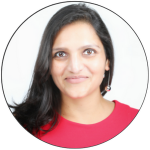Director of Scientific Outreach, American Society for Investigative Pathology
Director of Continuing Medical Education Program, The Journal of Molecular Diagnostics
Please tell us a bit about yourself (e.g. hometown, current locale, course of study).
I was born and raised in India where I spent the majority of my formative years in New Delhi, the busy capital city.
I have always been passionate about science. After completing my Master’s degree in Biotechnology from India, I relocated to Chicago to pursue a doctorate in Molecular Biology.
Though I strongly disliked writing my graduation thesis, something changed when I became a (empowered) post doctoral candidate and I actively started writing primary research manuscripts, book chapters, reviews, and such. I started enjoying scientific writing and editing so much that I began devoting my weekends to exploring volunteer opportunities in this space. It was not surprising when within a short period of a year I transitioned into scholarly publishing, a vast flourishing and constantly evolving industry that I knew nothing about!
Describe some of your current responsibilities, and what type of organization you belong to.
I currently work as Director of Scientific Outreach at over a century old not-for-profit society, the American Society for Investigative Pathology (ASIP). I also serve as Director of the Continuing Medical Education (CME) Program for the Journal of Molecular Diagnostics (JMD).
Within the scholarly publishing realm, my current responsibilities broadly include providing scientific editing oversight to the Editorial Staff, soliciting articles based on timely primary research, literature review, commentaries as well as Editorial content for the ASIP-managed Journals, reviewing manuscripts for ASIP-managed Journals, providing online content for these journals, collaborating with our Publisher, Elsevier, on Press Releases, etc.
I create bi-monthly exams for the CME program for clinicians and molecular diagnostics professionals for JMD based on the published content.
In addition, at ASIP, I work closely with the society leadership on existing and new initiatives toward fulfilling the goals and mission of the society, collaborating with partner societies, liasioning on several ASIP committees, expanding the society-managed journal portfolio, and maintaining high scholarly publication standards per the evolving landscape. I also support the Membership and Marketing departments of ASIP on member and reader outreach projects.
What was your first scholarly publishing role? How did you get that job? What path led to your current position?
I transitioned from scientific research to scholarly publishing as a Scientific Editor for The American Journal of Pathology (AJP) and JMD.
I had increasingly become interested in scientific writing and editing. I did not have any network connections in the scholarly publishing field so I started applying for roles in this field using job search engines and I came across this role and I was fortunate to get this tailor-made job after a series of interviews.
I have always been interested in scientific research and when scientific writing/editing became a passion, I started exploring (volunteer) opportunities to strengthen my skills and identified some key job types/roles that I was interested in and simply applied to these open positions.
If there was a pivotal moment or key person in your career development, please describe briefly.
Yes, the pivotal moment was when my husband pointed out that I was so passionate about scientific writing/editing that I was spending my personal time exploring this passion. He prompted me to think of it as a career. Upon exploring further, I found avenues to expand on this passion and transition into it professionally.
What tools, websites, and organizations do you find most valuable for your career development?
Society for Scholarly Publishing (SSP) is by far my favoritest. I have remained an active member since I transitioned into the scholarly publishing space almost a decade ago.
I have also benefited from the Council of Science Editors (CSE), American Medical Writers Association (AMWA), International Society of Managing and Technical Editors (ISMTE), and Women in Biology (WiB).
I took the Editors in Life Sciences (ELS) exam offered by AMWA for ELS certification.
What are some of the surprises/obstacles that you’ve encountered during your career?
I was pleasantly surprised to see how broad and fast evolving the scholarly publishing industry really is despite seeming the same from outside for decades. Also, despite hearing it over and over again, I am always pleasantly surprised when folks say that they were not aware of the scholarly publishing industry and they stumbled upon a role in this realm, much like I did.
Being an Asian woman (and now a mother and caregiver) has presented obstacles all my life. One obstacle I personally encountered in my scholarly publishing career was to move into a leadership role when I was confined with technical responsibilities in a small dedicated overworked team with huge demands to constantly meet sensitive timelines that continuously limited my ability to think beyond the mundane.
What do you wish you knew more about?
I wish I had more network connections when I initially transitioned into this space, a supportive mentor/sponsor to show me the ropes and elevate me per my strengths, a leader to empower me further to achieve all that I was already capable of achieving. I wish I had just reached out to folks that I admire in the space to learn from their experiences.
What advice would you give to people interested in a career in scholarly communications?
Network and collaborate in any and every direction possible as it would help you understand the
vast scholarly publishing landscape, help you realize and fine tune your passions, open up opportunities for you to contribute your skills, sharpen your knowledge, and strengthen your portfolio and understanding to leverage unique opportunities when they present themselves.
Find a mentor. If you don’t have one, reach out to someone you look up to with specific questions. You will be surprised how warm and humble folks can be in this, and many other industries.


